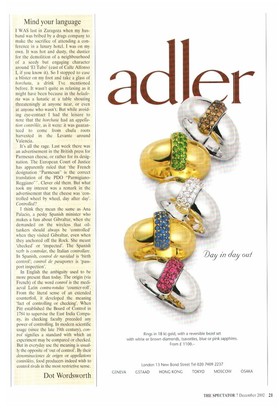Mind your language
I WAS last in Zaragoza when my husband was bribed by a drugs company to make the sacrifice of attending a conference in a luxury hotel. I was on my own. It was hot and dusty, the dustier for the demolition of a neighbourhood of a seedy but engaging character around 'El Tubo' (east of Calle Alfonso I, if you know it). So I stopped to ease a blister on my foot and take a glass of horchata, a drink I've mentioned before. It wasn't quite as relaxing as it might have been because in the heladeria was a lunatic at a table shouting threateningly at anyone near, or even at anyone who wasn't. But while avoiding eye-contact I had the leisure to note that the horchata had an appellation controlee, as it were: it was guaranteed to come from chufa roots harvested in the Levante around Valencia.
It's all the rage. Last week there was an advertisement in the British press for Parmesan cheese, or rather for its designation. The European Court of Justice has apparently ruled that 'the French designation "Parmesan" is the correct translation of the PDO "ParmigianoReggiano" ' . Clever old them. But what took my interest was a remark in the advertisement that the cheese was 'controlled wheel by wheel, day after day'. Controlled?
I think they mean the same as Ana Palacio, a pesky Spanish minister who makes a fuss about Gibraltar, when she demanded on the wireless that oiltankers should always be 'controlled' when they visited Gibraltar, even when they anchored off the Rock. She meant 'checked' or 'inspected'. The Spanish verb is controlar, the Italian control/are. In Spanish, control de nay/dad is 'birth control'; control de pasaportes is 'passport inspection'.
In English the ambiguity used to be more present than today. The origin (via French) of the word control is the mediaeval Latin contra-rotulus `counter-roll'. From the literal sense of an extended counterfoil, it developed the meaning 'fact of controlling or checking'. When Pitt established the Board of Control in 1784 to supervise the East India Company, its checking faculty preceded any power of controlling. In modern scientific usage (since the late 19th century), control signifies a standard with which an experiment may be compared or checked. But in everyday use the meaning is usually the opposite of 'out of control'. By their denominaciones de origen or appellations controlees, food producers indeed wish to control rivals in the most restrictive sense.
Dot Wordsworth










































































 Previous page
Previous page